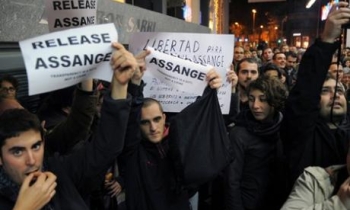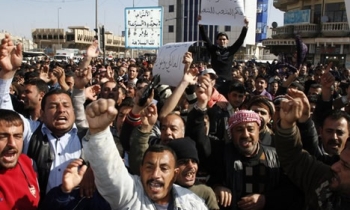DOHA, Qatar - This spring, the TV channel reviled for showing U.S. prisoners of war, hostage videos and messages from Osama bin Laden will launch an English-language spin-off, finally allowing Americans and other Westerners to judge Al-Jazeera for themselves.
To the Bush administration and other critics, Al-Jazeera is a dangerous platform for terrorists and an anti-American propaganda tool known for its bloody images of the civilian toll of U.S.-led wars in Iraq and Afghanistan. The station's journalists and many of its 40 million viewers, however, see it as the catalyst for an information revolution in the Islamic world, the first Arabic-language satellite channel to challenge authoritarian governments - and their Western allies.
Al-Jazeera International, a 24-hour news channel for English speakers, is expected to debut by the end of May. But how much of Al-Jazeera's controversial journalism will spill over to its sister station?
"We are here to build on the heritage of Al-Jazeera and bring their brand of fearless journalism to a much wider audience," said Nigel Parsons, the British managing director of Al-Jazeera International. "We are not completely divorced from one another."
Even before its first broadcast, however, the new channel has been the subject of vicious rumors and scathing criticism from Arab employees who fear that Al-Jazeera's in-your-face journalism will be watered down for Western audiences. They worry that Al-Jazeera International, or AJI as it's known here, will undo a decade-long struggle to build a brand with a distinctly Arab identity.
Banned by their employer from speaking on the record about their concerns, the journalists privately aired their most pressing questions: Why aren't there more Arab managers? How much does the new British-led team know about the region? Will they use "insurgents" or "terrorists" (considered a loaded word) to describe Iraqi fighters? And, most important, if AJI's mission is to become a global news alternative, what will distinguish it from, say, CNN or the BBC?
"The feeling is that they've built this brand with their blood and sweat and tears for 10 years, and now someone's going to come along and destroy it, jeopardize it, water it down," said a journalist from the Arabic-language channel who spoke on condition of anonymity. "There's just a lot of anxiety and resentment."
Parsons said Al-Jazeera International isn't going to be simply a translation of the Arabic version - it will have original programming and separate staff and broadcast centers around the world. However, he added, producers from both channels will share video and planning meetings. To quell fears, managers have arranged dinners and movie nights for the Arab staff and their new colleagues to get to know one another. Amid anger over the higher salaries paid on the international side, Parsons said a committee also is looking into benefits and salary.
"We are not here to bring down the Al-Jazeera brand," Parsons said. "We are here to build it up."
To say AJI is tight-lipped about its programming is an understatement. The new channel's staff in Doha was petrified to speak without permission, and officially arranged interviews with managers were recorded, on speakerphone, with a publicist present. The new channel hasn't announced all the names of its journalists, but of those made public, few are Arab. Among their best-known recruits so far are British television legend David Frost, Emmy-winning "Nightline" veteran David Marash and Rageh Omaar, a Somali-born journalist famous in Britain for his Iraq reporting.
AJI's managers say they don't want their many competitors learning too much about the channel or its on-air talent before the launch. Media analysts who recently visited the Doha headquarters of Al-Jazeera, however, say the tight message control also shows that the station is struggling with an identity crisis.
"If they really want to break into the U.S. market, the model shouldn't be the BBC - it should be Fox," said Marc Lynch, an American political science professor and author of a book on Al-Jazeera. "Be Al-Jazeera, but in English. Yes, it will be controversial, but take the controversy, lap it up and turn it into ratings."
Parsons said there would be Arab reporters in Cairo, Egypt; Beirut, Lebanon; Doha; Baghdad, Iraq, and in the Palestinian territories, but he's been quoted as saying that this won't be the "Islamic Channel." A lot of the programming will still come from headquarters in Doha, with the rest divided among broadcast centers in Washington, London and Kuala Lumpur, Malaysia.
Americans frustrated with mainstream media aren't the only target viewers for AJI. The channel is also wooing Arab immigrants in Europe, English speakers in the developing world and the millions of Asian and African Muslims who don't speak Arabic.
That's where people like Fatma Naib come in. The 28-year-old programming worker for Al-Jazeera International was born to Eritrean parents, lived in Saudi Arabia and Egypt, became a Swedish citizen and recently moved to Doha from London. She's smart, multilingual and pairs her brightly colored headscarves with cropped jeans. She was recently giddy over an interview with former Pakistani Prime Minister Benazir Bhutto, the first female head of state in a Muslim nation.
"As a veiled woman, I think my opportunities with any other network, even Arab networks, would have been limited," Naib said in a flawless British accent.
Arabic-speaking employees like Naib act as a bridge between the suspicious veteran Al-Jazeera workers and their new colleagues - and she wants to use that role to connect with AJI's new global audience. She said the debt owed to the original channel would become evident when the station debuts this spring.
"This is our mother," she said. "We're like the sister or the son."









